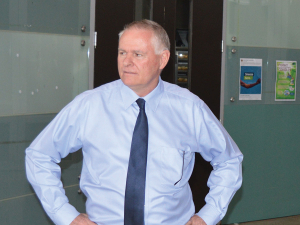The KVH (Kiwifruit Vine Health) chief executive will canvass growers in June to find out whether there's support for a legalised strategy on Psa such those in place for TB control in cattle or American foulbrood control in bees.
Legal clout would enable action to be taken against abandoned orchards, require growers to remove infected material, stop the movement of risk goods and require Psa to be reported.
"One area I want to focus on in my new role is whether our current approach is sufficient or whether we need an approach with more teeth or use of legal power when necessary," he says.
Some growers and industry representatives have told him they think there should be a more legally enforceable approach to protect responsible growers.
O'Neil says there will always be some growers who don't comply with the requirements because they can't afford it or they don't understand.
"In the wider Te Puke area there are 193 orchards that haven't reported Psa. Is that correct, with Psa being so very widespread in Te Puke?" he asks.
He says it's an offence to knowingly spread an organism such as Psa but the rules are unclear. "With a legal pest management strategy the rules would be clearly defined."
Psa-V has now hit 35% of New Zealand's kiwifruit orchards, mainly in the biggest growing area of Te Puke but Hawkes Bay, Kerikeri, Waikato, Manawatu and Nelson are still free of the disease. Some green varieties such as Hayward have an element of resistance to Psa but the Gold crop Hort 16A is particularly vulnerable and KVH does not believe it is sustainable. New varieties of Gold are to be released by Zespri shortly.
O'Neil will be talking to growers between harvest and winter grafting work.
"We want new varieties to be grafted in an environment where there is little if any bacteria to infect them. This gives them the maximum chance to re-establish and get growers back into production again as soon as possible."
















